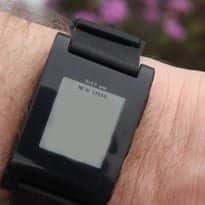Wearables to hit health mainstream
- 18 March 2014

Wellness and fitness activity monitors, such as Fitbit and Nike Fuel, are set to reach mainstream healthcare and will become routinely prescribed by doctors, a US analyst has predicted.
Speaking at the Wearable Technology Conference in London today, Shane Walker, an analyst with US research firm HIS, said that monitoring your activity and health will become a prescribed treatment within the next year.
Activity monitors for tracking steps, sleep and calories are largely the preserve of early adopter consumers who want to lose weight.
But Walker argues that the fast evolving category of health wearables, which has hit explosive growth over the past two years, will soon move from consumer driven desire to health need.
“You will be handed an activity monitor tied into your doctors’ electronic medical record, programmed when you leave the doctor’s office,” he said.
He predicted patients will be prescribed monitors that would come pre-programmed with how many steps they have to take daily.
“Patients will be incentivised to use activity trackers to better control their weight or blood sugar in return for reduced insurance premiums.”
Kip Fyfe, chief executive of sports technology firm 4iiii, suggested the ‘young wearables sector’ has to date steered clear of speaking about health.
“Are the terms wellbeing or wellness a bit of a cop out? We have been reluctant to talk about health. And we have definitely been afraid of the term ‘medical’, with FDA approvals,” he said.
“But in my view we are on a transformation from wellbeing to health. I think this is where the market is clearly going and from where the transformation will come.”
Fyfe said that one of the key drivers will be the very rapid evolution of the range and sophistication of sensors incorporated into health wearables, moving beyond accelerometers to ECGs together with new forms of location tracking.
For Gareth Jones, vice-president EMEA at Fitbit, the epidemic of chronic conditions like obesity is one of the key trends creating momentum for wearables in health.
The other three he identified were: consumers taking greater control of their health; advances in sensors; and the rise of the smart phone as the “Star Trek convergence device”.
“The health wearables market is in its infancy,” said Jones.
He quoted research by Jupiter predicting wearables sales worldwide will grow from $1.4 billion in 2013 to $19 billion in 2018, a figure he said was an under-estimate.
“CEA research, meanwhile, shows 60% of adults plan to purchase a fitness consumer electronic product,” said Jones
“We are in the very first stages of what is a revolution. Wearables tech will grow in ways that are not yet foreseen.”
He added that health wearables had the potential to begin to address holes in countries national budget spends on health.
Asked by the conference audience about evidence for health wearables, Jones said there were studies showing a strong correlation between monitoring and achievement of goals.
“I think these products will quickly start to become essential rather than preferential,” he said.




